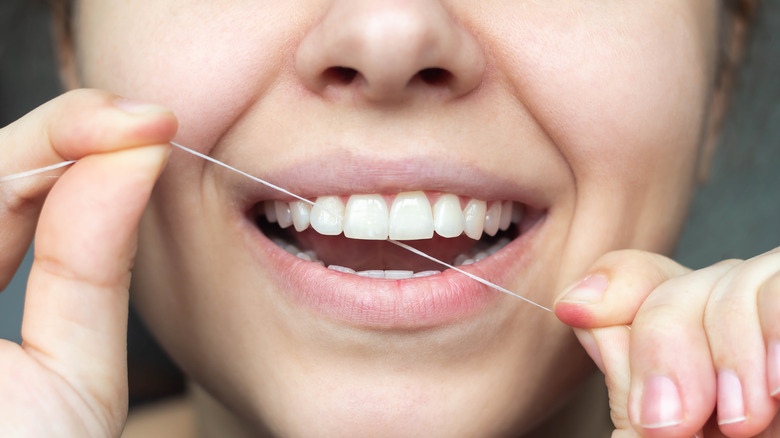The Best Way To Treat And Prevent Tonsil Stones
We typically never think about our tonsils, until they're giving us trouble. Since tonsillectomies are becoming less common than they used to be, according to Medical News Today, more and more people keep their tonsils and, thus, experience issues with them, such as tonsil stones.
Tonsils are the two organs at the back of the throat made of lymphocytes, cells that can suppress and combat infections (via WebMD). They act as a barrier for bacteria and viruses that can enter the body through the throat. When bacteria, mucus, and particles get trapped in the crevices on the surface of the tonsils, they can harden and form masses called tonsil stones.
Tonsil stones, or tonsilloliths, appear as small white or yellow dots on the tonsils, with some getting large enough to even protrude from the tonsils like small rocks (via Medical News Today). Although many people experience no symptoms at all, common symptoms include bad breath, ear pain, and the feeling of something being stuck in your throat.
Tonsil stones can be treated at home
Good oral hygiene is the first step to keeping tonsil stones at bay, according to the Mayo Clinic. Brushing your teeth, as well as your tongue, in the morning, evening, and after eating can help lower amounts of bacteria in your mouth. Similarly, rinsing with mouthwash regularly and flossing daily can help, too.
If you have tonsil stones already, they may be able to be treated at home. Gargling with salt water has many benefits — it can ease sore tonsils, get rid of bad breath, and even dislodge tonsil stones that are already forming (via Cleveland Clinic). Coughing strongly has been known to help tonsil stones loosen up and detach from the tonsils. If the stones are small enough, you can gently use a cotton swab to wipe the stone away.
If these remedies don't work or you have problems with recurrent tonsil stones, talk to your health care provider. While surgically removing the tonsils is somewhat controversial nowadays, it may be considered in extreme situations (via Healthline).


